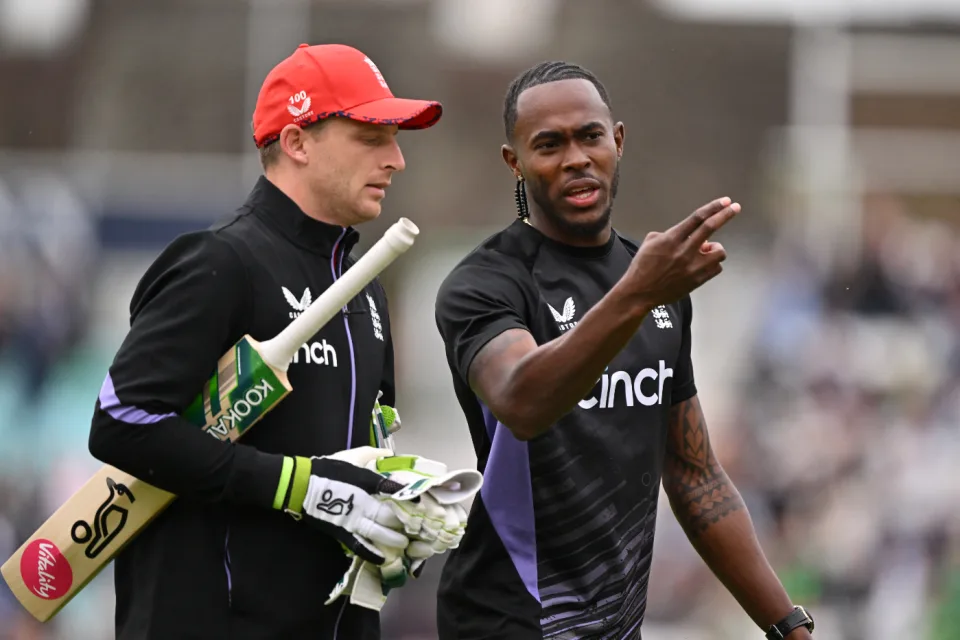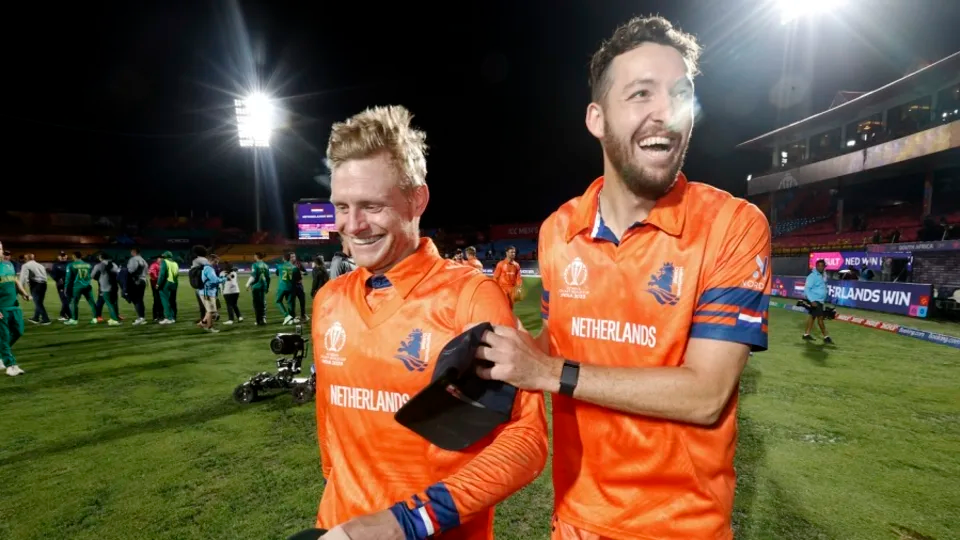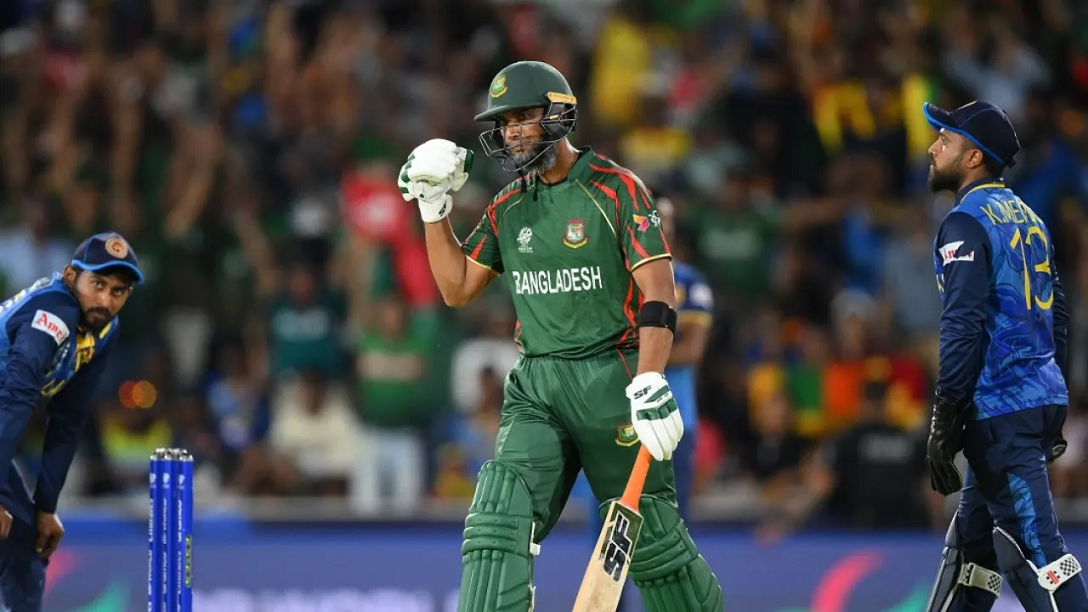Sports
Joe Root named Wisden’s leading cricketer in the world after stellar 2021

Joe Root, England’s outgoing Test captain, has been named as the Leading Cricketer in the World in the 2022 edition of Wisden Cricketers’ Almanack, which was published on Thursday.
Root, who stood down last week after an England record 64 Tests in charge, follows in the footsteps of his team-mate Ben Stokes, who claimed the honour in 2020 and 2021. Root’s run of outstanding personal performances included a haul of 1,708 runs at 61.00 in 15 Tests in 2021, but he has been powerless to prevent a run of form in which England have now won just one of their last 17 Tests.
“Root rose above the struggles of England’s Test side to produce one of the all-time great performances in a calendar year,” Lawrence Booth, Wisden’s editor, said. “His 1,708 runs have been beaten only by Mohammad Yousuf in 2006 and Viv Richards in 1976, and included six hundreds. And he scored his runs in his fifth year as England captain, at which point many of his predecessors had already called it a day.”
England played India in eight Tests home and away in 2021, losing five and winning two with a solitary draw at Trent Bridge. And as a consequence, two of India’s stand-out players, Jasprit Bumrah and Rohit Sharma, have been named among Wisden’s Five Cricketers of the Year – an honour which can be won just once in a player’s career, and is determined chiefly by their impact on the English home season.
“Jasprit Bumrah was central to India’s two Test wins last summer, taking three for 33 on the final afternoon at Lord’s, then thrillingly bowling Ollie Pope and Jonny Bairstow in successive overs to hasten his team to victory at The Oval,” Booth says. “Had rain not washed out the last day of the First Test at Trent Bridge, his nine wickets there might have led to an Indian win, too. In all, he managed 18 wickets at 20 apiece in the four Tests, and scored some unexpected – and crucial – tailend runs.
“Rohit Sharma was at the heart of his side’s 2-1 lead over England, and played starring roles with the bat at Lord’s, where he made an elegant 83 in treacherous conditions, and at The Oval, where his superb 127 helped India overcome a first-innings deficit of 99,” Booth added. “His series tally of 368 runs at 52 was higher than any of his team-mates.”
There were two other overseas recipients among the Five: New Zealand’s opener Devon Conway, whose 200 on debut at Lord’s set the tone for their 1-0 series win, ahead of their World Test Championship final victory over India at the Ageas Bowl in June; and the South Africa allrounder Dane van Niekerk, who captained Oval Invincibles to victory in the inaugural Women’s Hundred – a competition which Booth said had “changed the face of women’s cricket in England”.
England’s solitary Cricketer of the Year is Ollie Robinson, who made his mark as an incisive seam bowler with 28 wickets at 19.60 in his maiden home season, but whose debut against New Zealand was overshadowed by off-field controversy.
“On the second morning of the summer’s first Test, Ollie Robinson returned to fine leg, earning applause from spectators: less than rapturous, more than polite, it sounded like a show of support,” Booth wrote. “The previous evening, he had read out an apology after old tweets surfaced in which he insulted Muslims, women and Asians. And a few hours before that, he and other England players lined up wearing anti-discrimination T-shirts. For the ECB, scrambling to be on the right side of history, the timing was horrific.”
English cricket’s racism scandal is a major theme of this year’s Almanack, which includes a piece from Azeem Rafiq, the former player whose claims of discrimination at Yorkshire culminated in his emotional testimony before a parliamentary select committee in November. In his Notes by the Editor, Booth lays into what he terms England’s “annus horriblis”, and calls for the ECB chief executive Tom Harrison to return his share of a £2.1 million bonus for the board’s senior staff.
“Can there ever have been a bigger gap between what English cricket hoped to be, and what it was – between reality and fantasy?” Booth wrote. “Early in 2022, a long-planned assault on the Ashes ended with all-out surrender… Before that, a racism scandal brought to light by the courage of Azeem Rafiq made the game look unwelcoming, and worse. There was little to cherish.
“For overseeing the launch of The Hundred, ECB chief executive Tom Harrison and a few lucky colleagues stood to share a bonus of £2.1m. As the annus horribilis took shape, this felt more and more wrong.
“The ethics of the bonus scandal were as bad as the optics. But there was an exit strategy, if only Harrison would recognise it: the bonus should either be returned, allowing the ECB to re-employ some of the staff whose work still had to be done, or used to broaden the game’s diversity.”
Elsewhere in the Almanack, two other players are honoured for their performances in 2021. South Africa’s Lizelle Lee is named as the Leading Woman Cricketer in the World, after scoring more runs in 11 ODIs (632) at a higher average (90) than any other player, while Pakistan’s Mohammad Rizwan is named as the Leading Twenty20 Cricketer in the World, following a world-record 2,036 runs in all 20-over matches, at an average of 56.
(ESPN Cricinfo)
Sports
England face Australia in the battle of champions

The first truly heavyweight clash of this expanded T20 World Cup format comes freighted with both history and subplots. A rematch of the 2010 World T20 final at Kensington Oval, the match pits Jos Buttler’s defending champions – who are aiming to become the first team to retain the trophy – against the Australian winning machine, victors at the 2021 edition and current world title-holders in Test and ODI cricket. And that’s before you throw in the Ashes for afters.
Already there is added pressure on England, after the rain in Bridgetown led to a share of the points in their opener against Scotland (and that having conceded 90 runs from 10 overs without taking a wicket in a tepid bowling display). Lose to their oldest rivals and it will leave their Super 8 prospects open to being waylaid by the perils of net run-rate calculations, or worse.
The Scotland match was the third abandonment in five suffered by England, after a rain-affected home series against Pakistan, which has clearly hampered their readiness for this campaign after almost six months without playing T20 together. It does not take much for a side to click in this format – and England looked in decent shape when they did get on the field against Pakistan – but Buttler will be anxious for things to go their way on Saturday, if only to avoid further questions referencing the team’s disastrous ODI World Cup defence last year.
Australia, under the laidback leadership of Mitchell Marsh would love nothing more than to add to the English sense of jeopardy – having helped bundle them out of the tournament in India on the way to taking the crown. Their head to head record is less impressive in T20 however, with England having won six of the last seven completed encounters, as well as that 2010 final.
Despite a wobble with the bat, Australia avoided mishap against Oman earlier in the week, the experience of David Warner and Marcus Stoinis shining through in difficult batting conditions. Surfaces in the Caribbean – not to mention those games staged in the USA – have already had teams scratching their heads; rather than the “slug-fest” England had prepared for, following a high-scoring tour of the Caribbean in December, it looks as if boxing smart may be the way to go.
Speaking of Warner, this could be the last time he faces up against England in national colours – and another match-winning contribution would likely reduce the chances of them meeting again in the knockouts. On the other side of the card is Jofra Archer, fresh from an emotional maiden outing at Kensington Oval and ready to take on Australia for the first time in any format since 2020. Can Mark Wood fire up England’s campaign, as he did during last summer’s Ashes? Will Pat Cummins be back to harass the old enemy once again? Seconds out, it’s almost time to rumble.
Cummins is set to return after being rested for the Oman game, which saw Mitchell Starc leave the field with cramp. Starc is understood to be fine and could keep his place – which would likely see Nathan Ellis miss out. Marsh is still not fit to bowl, with Australia likely to continue with the allrounder combination of Stoinis and Maxwell to give them cover.
Australia (probable XI): David Warner, Travis Head, Mitchell Marsh (capt), Glenn Maxwell, Marcus Stoinis, Josh Inglis (wk), Tim David, Pat Cummins, Nathan Ellis/Mitchell Starc, Adam Zampa, Josh Hazlewood
The one change England may consider is Reece Topley coming in for Wood, with the expectation that there will be some rotation among the seamers through the course of the tournament.
England (probable XI): Phil Salt, Jos Buttler (capt & wk), Will Jacks, Jonny Bairstow, Harry Brook, Liam Livingstone, Moeen Ali, Chris Jordan, Jofra Archer, Adil Rashid, Reece Topley/Mark Wood
[Cricinfo]
Sports
South Africa up against their bogey team in batter-unfriendly New York

Once is coincidence, twice is a clue, and three times is proof.
To paraphrase Agatha Christie, that is the narrative around South Africa’s meeting with Netherlands at this T20 World Cup.
The Dutch beat South Africa at the 2022 tournament and ended their semi-final hopes in a match where South Africa appeared to be sleep walking, and then beat them again at the 2023 ODI World Cup, where they exposed South Africa’s vulnerability in the chase. If they to do the treble, not only will Netherlands take the lead in Group D, but they will offer conclusive evidence of the threat they pose to Full Members, especially South Africa.
Of course, it will take some doing after South Africa’s opening performance against Sri Lanka, where they reduced their opposition to their lowest T20I total and chased it down in fairly straightforward fashion thanks to the most stable middle-order of their white-ball era. In Aiden Markram, Tristan Stubbs, Heinrich Klaasen and David Miller, South Africa have bankers and big-hitters and, for this match, they also have the advantage of experience. They’ve already played at Eisenhower Park, and have first-hand knowledge that run-scoring doesn’t come easily;Klassen said they are prepared to use their “cricket brains” and play “smarter cricket”.
But the conditions could be good news for Netherlands, who are not naturally a line-up of big hitters and build their innings on a foundation of turning ones into twos. In other words, they tend to take a slightly more conservative approach to batting, which may work well here, but they’ll be wary of the uneven bounce of the surface and will have to come up with plans to counterattack especially against South Africa’s seamers. Their own bowlers were exemplary in Dallas and will look to build on that performance against a line-up that will likely be more proactive than Nepal’s, but who they have managed to keep quiet not once, but twice in the past. Third time’s the charm, they say.
Anrich Nortje’s stunning return to form against Sri Lanka means South Africa may not have to tinker with the bowling combination, and Gerald Coetzee and Tabraiz Shamsi may have to wait their turns to get a game. The batting line-up should be unchanged, with no space for Ryan Rickelton yet.
South Africa: Quinton de Kock (wk), Reeza Hendricks, Aiden Markam, Tristan Stubbs, Heinrich Klaasen (wk), David Miller, Marco Jansen, Keshav Maharaj, Kagiso Rabada, Ottneil Baartman, Anrich Nortje
Conditions in New York may tempt Netherlands to include an extra seamer and they have Kyle Klein in their squad. But it could come at the expense of a shortened batting line-up and they may not want to risk that.
Netherlands: Michael Levitt, Max O’Dowd, Vikramjit Singh, Sybrand Engelbrecht, Scott Edwards (capt, wk), Bas de Leede, Teja Nidamanuru, Logan van Beek, Tim Pringle, Paul van Meekeren, Vivian Kingma
[Cricinfo]
Latest News
Mustafizur, Rishad, Hridoy dazzle in Bangladesh’s tight two-wicket win over Sri Lanka

Nuwan Thushara’s last over brought Sri Lanka screaming back into the match,as he first bowled Rishad Hossain, and then nailed Taskin Ahmed in front of the stumps with a pinpoint swinging yorker. This left Bangladesh eight wickets down, with 12 runs still to get.
However, the experienced Mahmudullah was at the crease for Bangladesh, and despite some further nervy moments, pushed Bangladesh across the line off the last ball of the 19th over.
But this was a match chiefly decided by Bangladesh’s own outstanding bowling. Mustafizur Rahman was the best among them, using shorter lengths and his cutters efficiently, to claim figures of 3 for 17. Rishad Hossain’s three-for through the middle overs also kept Sri Lanka quiet.
Mustafizur was instrumental in Sri Lanka’s downward spiral through the middle overs, which culminated in a crash-and-burn end. Ultimately, their inability to find boundaries, or even rotate strike against good Bangladesh bowling resulted in their downfall. A score of 125 for 9 always seemed poor on a decent pitch, even if their bowlers made a match of it in the end.
Brief scores:
Bangladesh 125 for 8 in 19 overs (Towhid Hridoy 40, Litton Das 36; Dhanajaya de Silva 1-11, Nuwan Thushara 4-18, Wanidu Hasaranga 2-32, Matheesha Pathirana 1-27) beat Sri Lanka124 for 9 in 20 overs (Pathum Nissanka 47, Dhananjaya de Silva 21; Tanzim Hasan Sakib 1-24, Taskin Ahmed 2-25, Mustafizur Rahman 3-17, Rishad Hossain 3-22) by two wickets
[Cricinfo]





















